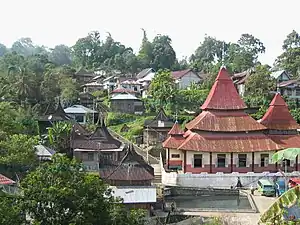Nagari (settlement)
A nagari is a semi-autonomous Minangkabau people regional administrative unit in West Sumatra, Indonesia.[1]

From 1983-1999 the national government attempted to apply the Javanese desa village system to other ethnic groups throughout Indonesia, and in 1983 the traditional Minangkabau nagari village units were split into smaller jorong units, with some disruption to traditional nagari-centred social and cultural institutions.[2] However following restoration of the role of the nagari in rural Minangkabau society after 1999 residence and employment in a nagari is still an aspect of social identity, just as residence in the smaller jorong, or membership of a clan.[3]
Etymology
Nagari comes from the Sanskrit word nagarī (नगरी) which means land or realm.
History
The nagari system already existed before the Dutch colonial times as "autonomous village republics" in Minangkabau society. The nagari comprises five fundamental institutions : it must have a road (berlebuh), bathing place (bertapian), meeting hall (berbalai), mosque (bermesjid) and square (bergelenggang).[4]
References
- Jamie Davidson, David Henley -The Revival of Tradition in Indonesian Politics 1134118201 2007 Page 204 "The nagari is the indigenous Minangkabau unit best described as a village, or a conglomeration of villages or settlements. It has often been seen as an autonomous 'village republic'; the content and extent of this autonomy is debated, "
- Kahin (1999) pp257–261
- Jennifer A. Fraser Gongs and Pop Songs: Sounding Minangkabau in Indonesia 2015 0896804909 "In contemporary times, if people reside and work in a nagari, their affiliation with the nagari is still a primary aspect of Social identity, just as is jorong residence and clan membership. Social life is Structured around these affiliations."
- Jeffrey Hadler (2008) A Historiography of Violence and the Secular State in Indonesia: Tuanku Imam Bondjol and the Uses of History The Journal of Asian Studies, Vol. 67, No. 3 (Aug., 2008), pp. 971-1010